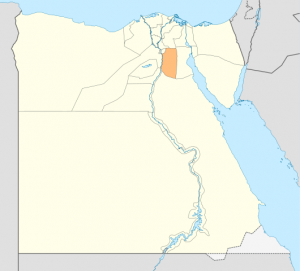Engaged Anthropology Grant: Dina Makram-Ebeid

Dina Makram-Ebeid is Research Fellow at the Max Planck Institute for Social Anthropology. She joins us today to relate her experience working with our Engaged Anthropology Grant in her fieldsite south of Cairo.
In December 2013 a large factory occupation took place at the Egyptian Iron and Steel Company (EISCO) in Helwan. EISCO is Egypt’s largest fully-integrated public sector steel plant located in the south of Cairo. The December occupation was led by young workers that joined the plant from 2007 to work on temporary and daily-waged basis. The occupation lasted a month with demands raised ranging from receiving the unpaid sixteen months’ worth of bonus pay to the ousting of the CEO and the corrupt union. This was the largest collective action in EISCO since 1989, when workers staged a strike that ended with the state security storming the plant, killing one worker and detaining and torturing many, including members of the public who stood in solidarity. As a post-doctoral research fellow at the Max Planck Institute for Social Anthropology in Germany, I returned to my doctoral field site in Helwan, Egypt from August 2013 to May 2014 to conduct more fieldwork on labour politics during the revolution. With the support of the Wenner-Gren Engaged Anthropology Grant I co-organised two workshops and an exhibition with my previous informants and with young members of the community.
The first workshop enabled the young generation of workers that led the recent occupation to exchange thoughts on their experience with the older workers who led the 1989 strike and to reflect on their demands, strategies and tactics. The exchange highlighted how each generation had different views on doing politics, which opened the space for more deliberation on the differences in opportunities and challenges each group had. Local academics, labour journalists and labour activists were present in various panels.
The platform allowed me to share with workers and others present in the workshop the findings of my PhD research, whose fieldwork I conducted on the shop-floors of EISCO and in the surrounding company town between 2008-2010. My PhD thesis focused on the place of the tenured work contract in public sector factories of Egypt, and how this form of contract comes to be a kind of potential property that crosses the boundaries of common understandings of “private property” and the “public sector.” I looked at the fragmentation of the labour force along the lines of access to permanent employment and how it was central to the state’s reproduction of dispossession. My work highlighted how EISCO jobs were primarily bequeathed to children of existing workers, thus denying ‘outsiders’ access to stable work and conditioning them to a perpetual proletarian condition. I argued in my research that this ability to bequeath positions to children enabled steel workers to consider themselves part of the middle class, intensified conflicts between tenured and untenured workers in the locality and undermined the solidarities in labour movement. The thesis showed how the immaterial labour of expanding networks and relations is made into a resource that is part of calculations regulating labour regimes that turn what I called ‘the politics of stability’ into norm.
The research findings were thus discussed in the workshop hand in hand with strategies to build solidarity among workers. During the sessions we discussed how the legal modifications made by the state, including the new Labour Law of 2003, which introduced temporary and daily employment in public plants for the first time, created a politics around permanent work contracts and continued to affect collective politics in the plant. We also discussed the challenges in countering the practice of bequeathing permanent jobs to one’s children. The closing sessions located alternatives to the labour regimes that were instated under Mubarak and reflected on organising with more precarious workers outside EISCO. Together we learnt about the mechanisms of labour governance over the longue durée and came up with ideas on how to counter them in practice. During the workshop I also shared with workers documents that I had gathered for my PhD research and which could aid them in their struggle. The documents ranged from bylaws of the plant, to a book collectively edited by workers on the 1989 strike, to various legal and media documents around the 1989 strike. These proved quite helpful to those engaged in organising workers in the plant.
The second workshop included film makers, workers and young members of the community in Helwan. The members of the community were introduced to the basics of film-making, from filming with small devices to film editing and were encouraged to do their own films. Talented members continued to work on a low-budget film project about work politics in Egypt. The experience gave the participants the tools to document the injustices around them and to connect with those who have some access to mainstream media. A final photo exhibition of the plant was placed around the space of the first workshop. It enabled reflections by the group on labour histories, collective memories, and alternative imaginations. Overall the workshops and exhibition were a success, they acted as platforms for knowledge sharing, for reflections on the current predicaments and for imagining alternative futures.